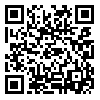ARTICLES IN PRESS
Back to the articles list |
Back to browse issues page
1- Shahrood University of Technology , shahroodm@gmail.com
2- National Institute of Agricultural Research, Avenue Ennasr, BP 415 Rabat principal, 10090 Rabat
3- Delta Research and Extension Center, Mississippi State University, Stoneville, MS 38776.
2- National Institute of Agricultural Research, Avenue Ennasr, BP 415 Rabat principal, 10090 Rabat
3- Delta Research and Extension Center, Mississippi State University, Stoneville, MS 38776.
Abstract: (515 Views)
Various factors, such as temperature stress, dietary changes, and the entry of contaminants and infections into the hemolymph, are known to affect insect immune responses by altering hemocyte profiles. The research focused on the hemocyte profile, hemogram across all biological stages, and the morphological and frequency changes of hemocytes in third instar larvae exposed to temperature stress. Cucumber fruits infected with insect larvae were collected and brought to the laboratory, where third instar larvae were extracted from the fruit tissue. The hemolymph was then collected, and after staining with Giemsa solution, hemocytes were identified under a light microscope. The hemogram analysis included measurements of DHC, THC, blood volume, and AHC across all biological stages. In third instar larvae, plasmatocytes and granulocytes were the most abundant, comprising about 56% of the hemocyte population. In contrast, prohemocytes were most frequent in the first instar larvae, accounting for approximately 37%. THC was highest in third instar larvae, indicating a direct correlation between hemolymph volume and total hemocyte count. Temperature stress had a significant impact on hemocyte numbers. Heat stress, with temperatures up to 30 and 35 °C, led to a notable increase in total cell count, granulocytes, and plasmatocytes. Conversely, cold temperatures resulted in a decrease in prohemocytes, plasmatocytes, granulocytes, and the total cell count compared to the control group. Additionally, temperature stress induced hemocyte deformation, with plasmatocytes and granulocytes showing the most pronounced changes under heat stress, including torn cell walls and loss of cell contents at 35 ○C.
Article Type: Original Research |
Subject:
Toxicology and Physiology
Received: 2024/04/17 | Accepted: 2024/01/1
Received: 2024/04/17 | Accepted: 2024/01/1
Send email to the article author
| Rights and permissions | |
 |
This work is licensed under a Creative Commons Attribution-NonCommercial 4.0 International License. |






